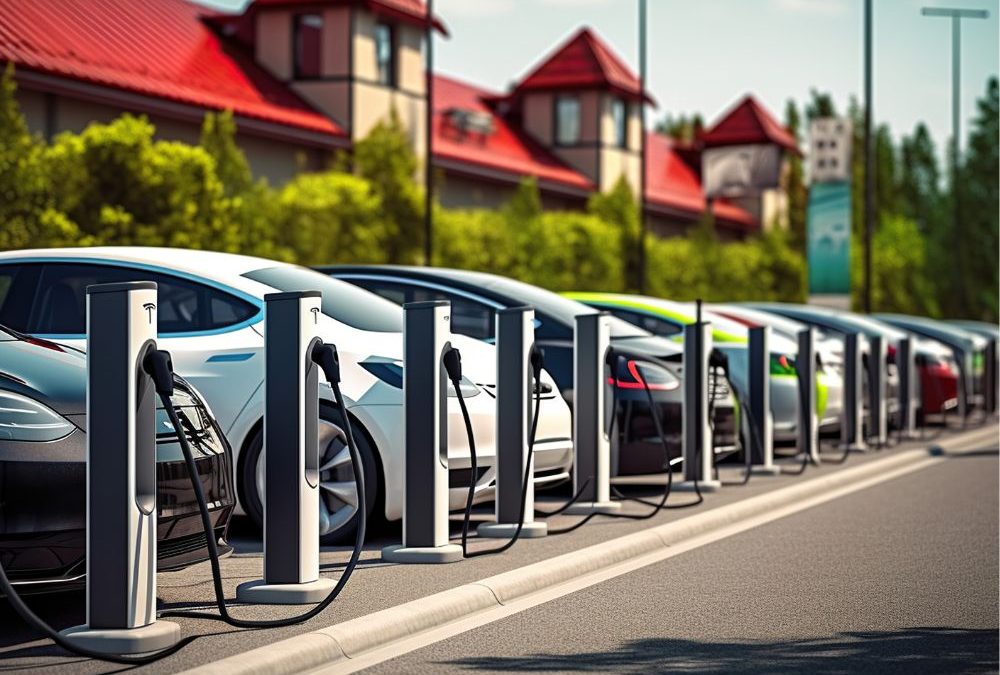There’s nothing like a global climate crisis to push us all into considering ways in which we can try to engage in the existential idea that we must do everything we can in order to save this very unique rock called Earth.
Before EVs, Let’s Remember the 3Rs
A couple of things that will summarize what follows:
- No Earth = no business. Anyone that still thinks climate change isn’t an issue hasn’t been paying attention to reality. This is a crisis that NONE of us can avoid.
- EVs – electric vehicles – won’t make much of an impact if we don’t strictly follow the 3Rs: reduce, reuse, recycle.
On the latter point, it’s important that we think of better ways to get around instead of just saying ‘let’s keep driving, but let’s pretend we’re saving the planet as we do so’.
- Reduce – stop buying ANY kind of cars, including EVs.
- Reuse – get better at maintaining existing cars and making them last longer
- Recycle – same as above, but find ways to make use of cars that already exist and get better rules in place to ensure we’re maximizing what we recycle from beaters (you know, the REALLY crappy cars)
But … let’s assume you’re bound and determined to buy a new car and you’d like an EV.
Cool.
One of the first objections that comes up is that related to mining, especially for rare earths and resources like lithium and cobalt. There’s crazy talk about mining the ocean floor for these minerals. Because nothing could go wrong with sensitive environments when we engage in this kind of activity.
Canada will actually benefit from this rush, but we have to start thinking about the impact these choices will have 30 years or so from now and not just in terms of a ‘new gold rush’.
But to be honest, I’m less concerned about the mining side of the EV equation, because we’re currently using substantially more lithium and other rare earths for golf carts and cell phones. Let’s stop distracting the public with the mining concern and focus on how we can use existing resources more efficiently.
Yeah, it’s a problem, but lack of planning for this big a shift in our society is a bigger challenge.
To take another transportation analogy in context of another, it feels like we’re putting the cart before the horse and we’re not going to get anywhere really fast.
Let’s walk through the challenges.
A Brief History

The electric car was actually the first ‘automated’ vehicle to make it to market, ahead of the gas-powered car.
The first electric car was introduced in 1832, with gas cars being commercialized much later in the 1870s.
By the early 1900s, electric cars were the only genuine option, but gas cars quickly popularized the romantic notion of roadtrips and ‘getting away from it all’. Around the same time, colonization of the west was nearly complete (something I won’t dive into right now), creating a vast territory of lands to be ‘discovered’.
Gas cars – and gas stations – started to overtake the electric car as long-distance travel was made more accessible to average citizens.
Thus began the era of buying 100% of a car for 2% of your use. Most of us use our cars for daily commutes less than 40km (usually less) each way, negating the need to keep filling up for 600km trips.
Electric cars also fell out of favour because the batteries simply weren’t efficient enough … at the time. They were heavy, lead-based batteries that limited trips for the average driver.
It’s said that there’s a famous conversation that happened between Henry Ford and Thomas Edison. The former asked “should I go gas or electric with car manufacturing?” Edison, having lost the ‘War of the Currents‘ to Nikola Tesla, damned humanity and the planet with his bitter defeat and affirmed ‘gas’.
Imagine how different things would have been had he voted for electric.
Currently, No Power Brownouts
If everyone went to EVs right now, there’s little doubt the electricity grid would be overwhelmed. Expect rolling blackouts.
To avoid that, we need houses and other infrastructure to oversupply the grid with renewable energy.
When researching solar, I discovered that Ontario Hydro can reject or limit the amount of electricity you produce if they CURRENTLY don’t need it.
Our household is limited to 4.5 kwh of generation, but our roof is big enough for 10 kwh. 4.5 will be enough, but why shouldn’t we build more and contribute more if we can and want to?
Unfortunately, Ontario Hydro is focused on CURRENT demand, not potential demand.
If the average household adds at least one EV and a few new features like an AC unit or other high-demand appliances, their CURRENT efforts will be blanked out by future household demand.
My takeaway on this? Now that Ontario Hydro is partially in private hands, they don’t want electricity to get more cost-effective for average citizens. Tell me I’m wrong.
To be honest, electricity (to paraphrase Nikola Tesla) should be free and in the hands of the people.
Unfortunately, we’re implementing a 30-year economic cycle that Ontario Hydro only thinks about in context of a quarter or two.
This has to change. Immediately.
Education Brownouts
We’re teaching kids about climate change and whipping them into a panic, but solutions are not being presented proactively.
If it’s our intent to turn every kid into a pessimist, we’re doing a fantastic job.
Ideally, we start to appreciate that maybe, just maybe, we should teach them how to shape their future in a better, greener way without burying them with a tired lexicon rooted in panic and alarm.
Assuming they want to graduate and go to a post-secondary program to study ‘how to save the planet in a functional way’ they probably won’t find it.
Educational desertification will shake them into our dysfunctional reality.
Our colleges aren’t training kids how to embrace this new industrial era of renewable energy and accountable environmental, sustainable and green (ESG) modeling.
It’s still the same-old, same-old.
Programs related to renewable energy and sustainability are VERY hard to find.
Our colleges aren’t training them in the numbers that we need them. If they have programs (eg. Fanshawe College in London, ON), they are not on main campuses (eg. St Thomas, ON), making them unattractive to students that want a full college experience. They’re also not training students to install EV chargers or do EV repair / battery replacement as mechanics.
Therefore, finding qualified technicians to install solar or help with other infrastructure needs will be like finding unicorns on Bay Street.
Municipal Code Must Change

Good luck finding a new house that’s a ‘house of the future’.
Those only exist in Disney-like fantasy rides and tours of ‘Tomorrowland’.
Sadly, we haven’t paid attention to the extremely brilliant warnings implicit in these rides.
We only munched on popcorn while being stupidly entertained.
Assuming we DO want to build the houses of tomorrow, who’s going to do that if we don’t change our municipal code? Ideally, these changes to municipal code would be based on a national minimum designed to maximize energy efficiency while reducing our carbon footprint.
We continue to allow housing construction without regard for ways to maximize grid contribution (ie. generating of renewable energy) and minimize consumption. In fact, it’s required by law in some municipalities that new homes be built with gas furnaces, not ground source heat pumps (a more efficient post-carbon heating/cooling source).
Municipal code hasn’t changed to account for the need for charging stations at home or new apartment developments.
There are a kazillion other ways that municipal code has to change immediately if we’re going to even come close to kind of reaching some targets:
- Limit parking spaces (if any) for new apartment builds. More importantly, limit the number of spots available for big box developments. Better yet, force them to make customers pay, just like they’d have to pay for parking in downtown areas. Another idea for parking lots: more green space and better (raised) pedestrian walkways for safety and for reducing temperatures.
- All renewable electricity (ie. off-grid) mindset for new houses
- No lawns (a colonialist mindest that has to go away)
- New roads would be MAX one lane each way for cars, with additional lanes for pedestrians and cyclists. Most of you who know me know that I don’t care much for bus planning BUT with larger cities, any new developments would require underground construction of tunnels for future subways
I could go on …
It’s time for developers to step up and demand change before rules are thrust upon them.
Retrofit Programs That Don’t Fit
MOST cities have interest-free loans to support the install of renewable electricity generation, BUT most of these loans are based on commitments to significantly reduce Green House Gas (GHG) emissions, usually to the tune of a minimum of 20%.
That’s the case with Kingston, ON where we live.
We bought our place 4 years ago and needed to get an update for our home heating and cooling systems.
We went with gas because everyone looks at us like we’ve got lobsters coming out of ears if we ask for anything else.
For folks like us that have just installed a gas furnace, guess what? You don’t qualify and you just sunk $10,000-$20,000 into a gas-burning asset that no one will want in 10 years.
Instead, you should install a ground-source heat pump, but finding qualified technicians is like finding unicorns in a big box parking lot. This goes back to the training issue and municipal code issue.
NO NEW BUILDS WITH GAS FURNACES.
I can see a lot of people wincing when they read my last comment, thinking “what about that one time when there was a blackout in the middle of winter and someone couldn’t heat their home and froze”. Yes, this is a problem, but what about the many times that people currently get enough electricity to pump cold air throught their 4,000 square foot homes causing brownouts and people dying from heat stroke?
In short, we NEED a radical change to municipal code IMMEDIATELY if we’re going to come anywhere near our targets for the Paris Accord and other carbon-reduction treaties.
However, as long as we have governments and businesses that are committed to making money and also making us feel guilty for living, we’re not going to get anywhere.
Tripping Up While Charging Ahead
We have failed to require national standards for chargers and battery recycling, two keystones that would make EV adoption feasible.
Of course, I am fully aware that most standards of this nature are dictated by international bodies and bigger blocks of countries (eg. the EU, US and China), but we’ve got to do our best to demand some kind of consistency with batteries and plugs.
Here’s why: I’ve already explained that we’re weak with education. Adding dozens of different plugs, voltages and charging types will only compound the questions that come up for potential customers, installers and even builders.
Also, batteries need to be recycled. There’s just no way I’m going to get an EV until I know that some kind of basic remedial effort is being made to repurpose the materials used in EV batteries.
Recycling has to happen.
Prices Aren’t Inflation, They’re Greed
Climate-conscious consumers are being gouged.
We get it when we try to buy organic. We get it when we buy expensive bags instead of using plastic.
It creates a lamb-like peace of mind, and we’re actually ready to do more.
BUT we’re facing price differentials with regular cars that range from 40% to 100%. Most of the price differentials coincidentally reflect the incentive programs in the two main provinces (Quebec and BC) that are paying grants in addition to the federal grant of $5,000.
The inconsistency across Canada has resulted in extreme shortages in Ontario and other provinces, resulting in false economic conditions for raising prices.
The question also arises whether or not our governments need to investigate whether or not the price differentials are legitimate.
Why Don’t We Own These Companies?
We’ve invested in and bailed out these car companies many, many times over the last few decades.
To my knowledge (please correct me if I’m wrong), we have not exerted any demands for producing EV cars in Canada as part of the packages offered.
We need to collect dividends for the people of Canada, not collect rust buckets.
Summary, Part II
Governments want us to change, but governments at all levels are going to have to change first.
We can take advantage of the massive economic potential of adaptation to the climate emergency, but individuals CANNOT and WILL NOT do it out of the good of their hearts. And pocketbooks.

Follow up on this article.
Canada’s National Observer:
Canada & EVs: We Need to Pick a Lane